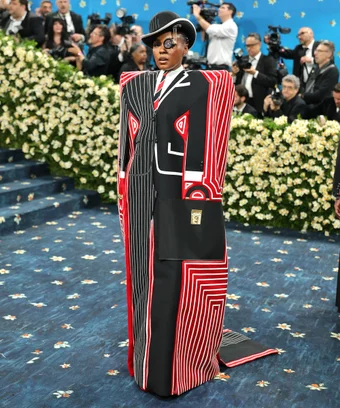When Mara Brock Akil first read Judy Blume’s Forever as a preteen in the 1980s, she saw herself in its pages—even though its characters were white. Now, decades later, the prolific showrunner has reimagined the iconic coming-of-age novel as a Black love story for a new generation.
Premiering May 8 on Netflix, Forever follows Keisha Clark (Lovie Simone), a fiercely ambitious track star, and Justin Edwards (Michael Cooper Jr.), a sensitive basketball player navigating family expectations, as they fall in love, explore their sexuality, and face the messy realities of adolescence. Set against the backdrop of 2018 Los Angeles—where police brutality and the Black Lives Matter movement loom large—the series retains the heart of Blume’s original while centering Black joy, intimacy, and struggle.
A Personal Journey from Reader to Storyteller
For Akil, adapting Forever was more than just another project—it was a full-circle moment. Growing up, she devoured Blume’s novels despite their lack of Black characters. “Technically, this description is about white characters,” she says, “but I saw myself, I saw my friends, I saw my world.”
That ability to see herself in stories not written for her was shaped by early encounters with representation—like the November 1981 issue of Seventeen magazine featuring a 17-year-old Whitney Houston. “I was obsessed,” Akil recalls. “When she made it to the cover, I just felt like I made it to the cover.” Houston’s presence in a predominantly white space signaled possibility, and Blume’s books—with their frank portrayals of teenage desire and angst—became a blueprint for Akil’s own storytelling.
Now, with Forever, she’s paying it forward. “I deserve to have access to that story just as much as James L. Brooks did,” she says, referencing the director behind Are You There God? It’s Me, Margaret. “Why wouldn’t I?”
Modernizing the Story for Today’s Teens
Blume’s 1975 novel was groundbreaking for its honest depiction of teen sexuality, but Akil knew the adaptation needed to reflect contemporary realities. In the age of social media, private moments can become public spectacle overnight—something Keisha learns the hard way when a video of her with an ex goes viral.
“The phone is a connection, it’s a disconnection,” Akil explains. “Even the nature around blocking, how we miscommunicate—both young and grown people are using it in their sexual experience. It can heighten it in some ways, but it can also be very damaging.”
The series doesn’t shy away from these complexities, exploring consent, digital privacy, and the pressures Black teens face in predominantly white spaces. Justin, for instance, grapples with his mother’s (Karen Pittman) insistence that he attend her alma mater, Northwestern—a reflection of the tension between Black parental aspirations and a younger generation’s desire to define success on their own terms.
Why This Story Still Matters
Despite being nearly 50 years old, Forever remains controversial, still landing on banned book lists in some schools. Akil sees her adaptation as part of a broader mission to tell unfiltered truths—something she also did with her 2023 documentary Stamped from the Beginning, based on Ibram X. Kendi’s book about anti-Black racism.
“It’s unfortunately what [books] people wanna take off the shelves,” she says. “The truth is, not all young people are choosing to engage sexually, but they are curious.”
For Akil, Forever is more than just a love story—it’s a testament to Black resilience, self-discovery, and the right to claim space in narratives that weren’t originally meant for you. As she puts it: “If anybody has the receipts of loving our people, it is me.”
Forever is now streaming on Netflix.




